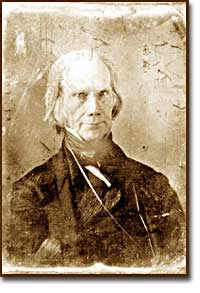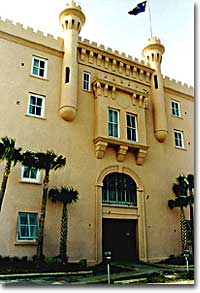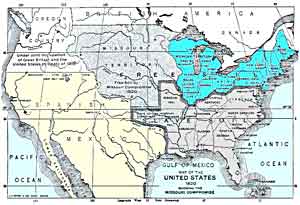23c. The Missouri Compromise

Henry Clay was first elected to the Senate in 1807, before his 30th birthday. This was against the rules set up in the Constitution that stipulated 30 as the youngest age for a Senator.
Most white Americans agreed that western expansion was crucial to the health of the nation. But what should be done about slavery in the West?
The contradictions inherent in the expansion of white male voting rights can also be seen in problems raised by western migration. The new western states were at the forefront of more inclusive voting rights for white men, but their development simultaneously devastated the rights of Native American communities. Native American rights rarely became a controversial public issue. This was not the case for slavery, however, as northern and southern whites differed sharply about its proper role in the west.
The incorporation of new western territories into the United States made slavery an explicit concern of national politics. Balancing the interests of slave and free states had played a role from the very start of designing the federal government at the Constitutional Convention in 1787. The crucial compromise there that sacrificed the rights of African Americans in favor of a stronger union among the states exploded once more in 1819 when Missouri petitioned to join the United States as a slave state.

The South Carolina State Arsenal, nicknamed the "Old Citadel," was constructed after Denmark Vesey's slave uprising in Charleston, South Carolina.
In 1819, the nation contained eleven free and eleven slave states creating a balance in the U.S. senate. Missouri's entrance threatened to throw this parity in favor of slave interests. The debate in Congress over the admission of Missouri was extraordinarily bitter after Congressman James Tallmadge from New York proposed that slavery be prohibited in the new state.
The debate was especially sticky because defenders of slavery relied on a central principle of fairness. How could the Congress deny a new state the right to decide for itself whether or not to allow slavery? If Congress controlled the decision, then the new states would have fewer rights than the original ones.
Henry Clay, a leading congressman, played a crucial role in brokering a two-part solution known as the Missouri Compromise. First, Missouri would be admitted to the union as a slave state, but would be balanced by the admission of Maine, a free state, that had long wanted to be separated from Massachusetts. Second, slavery was to be excluded from all new states in the Louisiana Purchase north of the southern boundary of Missouri. People on both sides of the controversy saw the compromise as deeply flawed. Nevertheless, it lasted for over thirty years until the Kansas-Nebraska Act of 1854 determined that new states north of the boundary deserved to be able to exercise their sovereignty in favor of slavery if they so choose.
Democracy and self-determination could clearly be mobilized to extend an unjust institution that contradicted a fundamental American commitment to equality. The Missouri crisis probed an enormously problematic area of American politics that would explode in a civil war. As Thomas Jefferson observed about the Missouri crisis, "This momentous question, like a fire-bell in the night, awakened and filled me with terror."

In an attempt to keep a legislative balance between the pro- and anti- slavery factions, the Missouri Compromise delineated which states would be free and which would not.
African Americans obviously opposed slavery and news of some congressional opposition to its expansion circulated widely within slave communities. Denmark Vesey, a free black living in Charleston, South Carolina, made the most dramatic use of the white disagreement about the future of slavery in the west. Vesey quoted the Bible as well as congressional debates over the Missouri issue to denounce slavery from the pulpit of the African Methodist Episcopal church where he was a lay minister. Along with a key ally named Gullah Jack, Vesey organized a slave rebellion in 1822 that planned to capture the Charleston arsenal and seize the city long enough for its black population to escape to the free black republic of Haiti.
The rebellion was betrayed just days before its planned starting date and resulted in the execution of thirty-five organizers as well as the destruction of the black church where Vesey preached. Slaveholders were clearly on the defensive with antislavery sentiment building in the north and undeniable opposition among African Americans in the south. As one white Charlestonian complained, "By the Missouri question, our slaves thought, there was a charter of liberties granted them by Congress."
African Americans knew that they could not rely upon whites to end slavery, but they also recognized that the increasing divide between north and south and their battle over western expansion could open opportunities for blacks to exploit. The most explosive of these future black actions would be Nat Turner's Virginia slave revolt in 1831.






